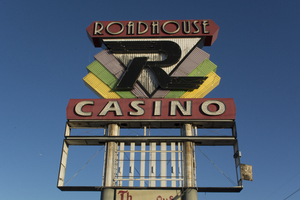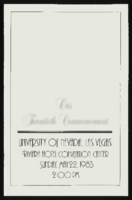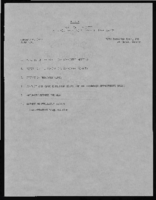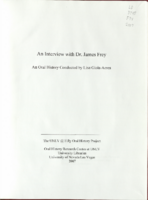Search the Special Collections and Archives Portal
Search Results

Transcript of interview with D. Taylor by Claytee White, July 25, 2014
Date
Archival Collection
Description
D. Taylor knew from the time he graduated Georgetown University he wanted to make his career in the labor movement. He credits his Virginia-born mother as an early mentor; she was at once “nice,” “tough,” “genteel,” and “liberal,” and she instilled these values in her son. As a new college grad, Taylor headed west to Lake Tahoe, where he was hired in 1981 by the Culinary Union to organize workers and oversee an eleven-and-a-half-month strike. Culinary then sent him to organize Las Vegas in 1984, a few years after Ronald Reagan crushed the 1981 Professional Air Traffic Controllers Organization strike and only months after the Amalgamated Transit Union strike against Greyhound went down in defeat. In this interview, Taylor recalls that in 1984, most Las Vegas casinos were no longer owned by individuals and families but by multinational corporations that refused to negotiate improved health insurance coverage for their workers. Taylor led a citywide strike that ultimately cost the union six casinos and about eight thousand members. In 1987, Culinary sent him back to Las Vegas, where he has remained. He tells the history of the union in Las Vegas and its leadership, especially crediting Al Bramlet in the 1970s for recruiting a diverse workforce and promoting casino hiring through the union. In 1987 Taylor changed the union rep structure to give a larger voice to Las Vegas’s racially diverse workforce and began recruiting potential leaders of color (like Hattie Canty)—thus, he followed Bramlet’s lead but pushed it further to create a truly bottom-up organization. The husband and father is especially proud of the various programs Culinary Workers Union Local 226 has implemented to improve the lives of Las Vegas union workers and their families but sees widening gaps in the city between those who have great wealth and those who do not. To Taylor, his work is “always about the members. They endure so much. They sacrifice so much.”
Text

Photographs of Roadhouse Casino sign, Las Vegas (Nev.), March 14, 2017
Date
Archival Collection
Description
Site address: 2100 N Boulder Hwy
Sign owner: Robert McMackin
Sign details: Roadhouse approved for gaming 1988, Robert McMackin bought the Roadhouse 1992, but it closed 2002. They planned to refurbish and reopen by 2010 but has been in legal trouble and has not reopened.
Sign condition: 2- reader board portion/plastic back lit portion is gone and paint has faded drastically
Sign form: Pylon
Sign-specific description: Big Letters on top "Roadhouse" below Is a Huge Letter "R". Still up but in horrible condition. Reader board is a frame and appears to be scrapped. No upkeep has been made to the sign. There is an array of colors behind the 'R' such as purple, white, yellow and green in a parallel plume shape.
Sign - type of display: Neon
Sign - media: Steel
Sign - non-neon treatments: There must have been plastic on this sign since there is a sign box that would contain it.
Sign environment: This location is on Boulder Hwy. near Sunset Road.
Sign - thematic influences: The letter R in the middle of the sign is remnant of the 1980's car/video game font.
Survey - research locations: Las Vegas Sun Article synopsis https://vegasinc.lasvegassun.com/business/legal/2012/mar/26/city-henderson-reverses-course-roadhouse-casino-li/ Review Journal article https://www.reviewjournal.com/business/casinos-gaming/station-casinos-henderson-settle-roadhouse-dispute/
Survey - research notes: The articles were helpful with finding information on this property since other avenues did not have any information on it.
Surveyor: Wyatt Currie-Diamond
Survey - date completed: 2017-09-01
Sign keywords: Pylon; Neon; Steel; Plastic; Incandescent; Backlit; Back to back
Mixed Content

James Matson interview, February 23, 1980: transcript
Date
Archival Collection
Description
On February 23, 1980, Ken Rose interviewed James Matson (b. July 14, 1923 in Pensacola, Florida) about his life in Las Vegas, Nevada. Throughout the interview, Matson discusses his childhood, life in Florida before moving to Las Vegas, his family and what brought him to Las Vegas. Matson also delves into his economic struggles and those of the community, his attempt to purchase a home and the changes he would like to see in society. Moreover, Matson talks about his hobbies, his work in construction and interracial friendships. The interview ends with Matson discussing the city of Las Vegas, the weather and the changing buildings.
Text

University of Nevada, Las Vegas (UNLV) 22nd commencement program
Date
Archival Collection
Description
Commencement program from University of Nevada, Las Vegas Commencement Programs and Graduation Lists (UA-00115).
Text

University of Nevada, Las Vegas (UNLV) 20th commencement program
Date
Archival Collection
Description
Commencement program from University of Nevada, Las Vegas Commencement Programs and Graduation Lists (UA-00115).
Text

Interview with Bennie Reilley, Sr., May 10, 2004
Date
Archival Collection
Description
Access note: May not quote in any form without written permission from interviewee
Text

Economic Opportunity Board of Clark County (Nev.): memos, agendas, and meeting minutes
Date
Archival Collection
Description
From the Clark County Economic Opportunity Board Records -- Series I. Administrative. This folder contains memos, agendas and minutes from meetings of the Clark County Economic Opportunity Board in 1966.
Text

Transcript of interview with Dr. James Frey by Lisa Gioia-Acres, February 14, 2007
Date
Archival Collection
Description
Text
Countess, Jerome "Jerry"
Former director of Combined Jewish Appeal, which became the Jewish Federation of Las Vegas
Person

